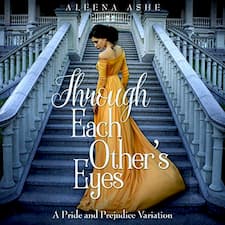Through Each Other's Eyes by Aleena Ashe.
My rating: 3 of 5 stars ⭐⭐⭐
Duration: 3 hrs 56 mins.
Publisher: Aleena Ashe.
#BennetSistersScale: Lydia - 🌹🌹 Lively and highly unconventional, rewriting any rule that stands in its way.
Audible Summary: "At the Netherfield Ball, Elizabeth Bennet and Mr. Darcy are at wit’s end with each other. Darcy can no longer deny his growing attraction to her, but she is clearly not ready to hear him. Elizabeth is confused by the many versions of Mr. Darcy she has encountered. She seeks refuge from the crowds, including her ridiculous family, on the terrace. He finds solace in the empty library. Grappling with their own feelings, each look up at the night sky. The evening is fine and the stars shine in their multitude reminding Elizabeth and Darcy just how small they are. While looking up at the Heavens, each notices a shooting star streaking across the sky. And each makes a wish: to better understand the other. Neither is ready for what happens next.
The day dawns bright but almost immediately, Elizabeth realizes something is very wrong. She is not in her room, not even in her own home. But it was not until she saw her - or rather his - reflection in the mirror that the magnitude of her situation becomes apparent. She has somehow come to inhabit Mr. Darcy’s body! Meanwhile Mr. Darcy, who had imbibed too much wine the night before, remains blissfully unaware of his situation while he sleeps. It was not until much later in the day than is his usual wont, that he finally awakes and discovers that he too is not himself.
Somewhat ironically for this audiobook, I'm always in two minds about 're-tellings' of famous stories unless they bring something new to the tale, such as with Jo Baker's Longbourn, which recounts the lives below stairs of the Bennet family's servants. It often feels a little like a rip-off of another's work when the likeness to the original is more directly observed, but that is not a concern here. In this instance, the audiobook calls itself a "Pride and Prejudice Variation", but I prefer to think of it as an (oft interchangeable) 'vagary', for its extraordinary nature well suits the second definition, in particular:
My rating: 3 of 5 stars ⭐⭐⭐
Duration: 3 hrs 56 mins.
Publisher: Aleena Ashe.
#BennetSistersScale: Lydia - 🌹🌹 Lively and highly unconventional, rewriting any rule that stands in its way.
Through Each Other's Eyes by Aleena Ashe is a fantastical re-imagining of the Regency's most famous tale. However well you think you know Mr Darcy and Elizabeth Bennett, they are about to become far better acquainted with each other...
The day dawns bright but almost immediately, Elizabeth realizes something is very wrong. She is not in her room, not even in her own home. But it was not until she saw her - or rather his - reflection in the mirror that the magnitude of her situation becomes apparent. She has somehow come to inhabit Mr. Darcy’s body! Meanwhile Mr. Darcy, who had imbibed too much wine the night before, remains blissfully unaware of his situation while he sleeps. It was not until much later in the day than is his usual wont, that he finally awakes and discovers that he too is not himself.
While Through Each Other's Eyes stays true to the overall character of the Pride and Prejudice, the radical change in the characters’ situation allows for some changes in perspective and timing, as well as some sensual situations but no explicit sex scenes. It includes all the original characters but also adds a few new ones.
©2019 Ashley Fass Rice (P)2019 Ashley Fass Rice."
Vagary[ vuh-gair-ee, vey-guh-ree]
noun, plural va·gar·ies.
.1. An unpredictable or erratic action, occurrence, course, or instance:
the vagaries of weather; the vagaries of the economic scene.
.2. Whimsical, wild, or unusual idea, desire, or action.
I loved the idea of taking a familiar story which is set very much in an ordered, predictable reality and turning it into something fantastical which still has to try and follow the rules of etiquette when the laws of physics and reason have flown. It did not disappoint, with Darcy and Elizabeth forced to gain a greater understanding of life on the other side of the strict gender-divide.
As intrigued as I was by the unusual premise, I would have liked to see at least one encounter between Elizabeth and Darcy played out before the fantasy element of the book kicked in, even if it had been an invented, non-canonical moment. Whilst I cannot imagine that many listeners choose this book without being familiar with the original, I felt that it needed something to set up the spark and tension between them, as the reflective inner-monologue at the start felt a little cold. There was also not enough differentiation between Lizzy's tone and Darcy's in that initial introspection, and I would have preferred for their similarities to be slowly revealed as they realised it themselves, rather than having them sound so alike from the beginning.
Through Each Other's Eyes rewrites a little of Austen's timeline, changing a few of the outcomes in the process, and though it remains faithful to the tone of the original, it often riffs rather loosely on the Pride and Prejudice we know and love. I did like what Ashe did with Mary Bennet, whose fate I always thought would have suited this particular path.
Though the story remains engaging, the writing could do with a little polish in places, and there is quite a lot of anachronistic language used; with several Americanisms also detracting from its authenticity. The use of "loo" for toilet is British, but does not gain ground until the mid-20th Century, more than a century after the Regency era. Saying "pants" instead of trousers was even later, and to the best of my knowledge even then it was not really interchangeable with the earlier style of breeches. It was also much more common in US English than UK, so feels very out of time and place. Elizabeth would also have known that the "front flap of his breeches" was called the 'fall'. Though she grew up without brothers, it had been too common a style for too long, and fashion too much a part of Regency gossip, for her to be entirely unaware of the correct terminology. "Vests" are also called 'waistcoats' in England, to this day, with the pronunciation at the time sounding more like 'WAISTc't'.
One of the most egregious Americanisms was the use of "diaper" for nappy/napkin, which is not only mid-19th century in popularity, but would not have been used in England at all. Babies' lower swaddling clothes would have been called 'napkins' or 'tailclouts' (sometimes just 'clouts') in the Regency era, and were often covered by an additional protective layer called a 'pilch' or 'pilcher'. 'Diaper' as the name of a kind of fabric was used, but the material was associated with much finer garments originally, and everyday items like table linens later on. It was not a fabric that Regency infants would have soiled, except perhaps when spilling a bowl of sloppy food once weaned. There is a fascinating article on the etymological divergence between the UK and US usages of the word 'diaper' on the Darlings Down Under blog.
It could be argued that there are so many impossible aspects to this book that equal liberties could be taken with the language and wider historical context, but I think that it needs some order to juxtapose the chaos, and in many ways it is far easier to picture the straight-laced Mr Darcy lacing himself into a corset than it is to imagine him doing anything that might at the time have been considered Colonial.
Despite those frustrations, this book was a fun, lighthearted diversion which is perfect for those who enjoy re-tellings of this particular love story; providing you can suspend your disbelief and don't expect anything to make complete sense. For example, the fact that they don't really panic, beyond some initial syncope, or seek out a religious or mystical explanation is unusual given the Church's grip on the era, but nor do they search for understanding from books or enlist anyone's aid. It's all very accepting and apologetic, as if the mix up is a mere trifle. The general tone of the
Freaky Friday
element seems to be: "Dear me, I appear to be residing within your person! Terribly sorry, ma'am, and to compound the distress I don't think I clipped my toenails before we switched places, what will you think of me when you see our feet! It really is too much to be borne..."
Siobhan Waring, the narrator, did an impressive job of keeping track of the voices, especially once the body switch had taken place and Darcy spoke aloud with Elizabeth's voice, but articulated his thoughts with his own, and vice-versa. It must have taken considerable skill (and no doubt a lot of highlighter) to make such frequent switches without getting muddled. She had a very expressive voice but was sometimes a little too terse and clipped as the lively Elizabeth, especially at the start. I don't think she quite captured Elizabeth's spirit at the beginning, but she did warm into it and I marvelled at her ability to make sense of such tortuous conversations.
I'd recommend this book to anyone who would like to view a familiar tale through very different eyes.
I'd recommend this book to anyone who would like to view a familiar tale through very different eyes.
*I received this audiobook free of charge in the hope of an honest, unbiased review.
(Click here to buy this book, listen to a sample, or add it to your wishlist!)













No comments